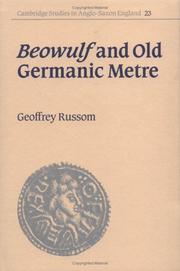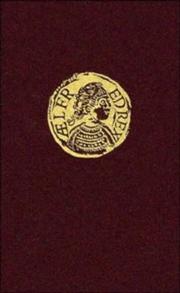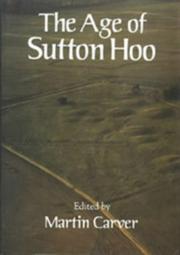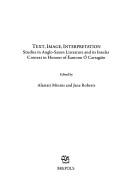| Listing 1 - 8 of 8 |
Sort by
|
Book
ISBN: 9631351408 Year: 2002 Publisher: Budapest : Corvina,
Abstract | Keywords | Export | Availability | Bookmark
 Loading...
Loading...Choose an application
- Reference Manager
- EndNote
- RefWorks (Direct export to RefWorks)
Angelsaksische cultuur --- Groot-Brittannië --- Woordenboeken. --- Cultuurgeschiedenis
Book
ISBN: 9782503554907 2503554903 Year: 2015 Volume: 16 Publisher: Turnhout: Brepols,
Abstract | Keywords | Export | Availability | Bookmark
 Loading...
Loading...Choose an application
- Reference Manager
- EndNote
- RefWorks (Direct export to RefWorks)
This book is a study of Aldhelm (c.639-709) and his complementary roles as a spiritual theorist in a nascent Christian society and as an ecclesiastical administrator. In both, he is shown as innovative and purposeful. His own theology responded to an experiential knowledge of the realities of power in his society. Born into West Saxon royal kin, he spoke directly to the concerns and needs of his aristocratic society, transforming the patristic norms of Christian behavior into the heroic concepts intuitively meaningful to his Germanic society. For Aldhelm, the dedicated virgin was as heroic as a warrior serving his lord. Despite the extensive work on the long-neglected Aldhelm by this last generation of Anglo-Saxonists, which has succeeded in restoring him as a major subject of Anglo-Saxon studies, there has not been a book-length treatment of Aldhelm’s career as a whole in over a century. Thus, the present book seeks to move beyond the somewhat parochial concerns of Anglo-Saxon history to bring Aldhelm into the mainstream of Late Antique studies, a figure as fully at home with the cultural trappings of Rome as he is with Christian patristic literature. Aldhelm was unique, among his fellow Anglo-Saxon notables of his period, in being a high ecclesiastic also engaged in innovative scholarship, though, in this, he stood very much in the mainstream of the great figures of Christian Late Antiquity, East and West, uniformly bishops and scholarly theologians. In many ways, Aldhelm was the last significant figure of Late Antiquity in the West.
Aldhelme of Sherborne --- Angelsaksische beschaving --- Angelsaksische cultuur --- Anglo-Saxon civilization --- Beschaving [Angelsaksische ] --- Civilisation anglo-saxonne --- Civilization [Anglo-Saxon ] --- Cultuur [Angelsaksische ] --- Aldhelm, --- Aldhelm --- Criticism and interpretation --- Christian saints --- England --- Biography --- Civilization --- To 1066 --- Church history --- 449-1066 --- Christian saints. --- Civilization, Anglo-Saxon. --- Civilization. --- Criticism and interpretation. --- To 1066. --- England. --- Aldhelmus ep. Shireburnensis --- Aldhelm, - Saint, - 640?-709

ISBN: 0521593409 0521093090 0511582986 0511002793 Year: 1998 Volume: 23 Publisher: Cambridge : Cambridge university press,
Abstract | Keywords | Export | Availability | Bookmark
 Loading...
Loading...Choose an application
- Reference Manager
- EndNote
- RefWorks (Direct export to RefWorks)
Alliteration. --- Civilization, Anglo-Saxon. --- English language --- Germanic languages --- Rhetoric, Medieval. --- Rhythm. --- Versification. --- Alliteratie --- Alliteration --- Allitération --- Angelsaksische beschaving --- Angelsaksische cultuur --- Anglo-Saxon civilization --- Beschaving [Angelsaksische ] --- Civilisation anglo-saxonne --- Civilization [Anglo-Saxon ] --- Cultuur [Angelsaksische ] --- Medieval rhetoric --- Middeleeuwse retorica --- Retorica [Middeleeuwse ] --- Rhetoric [Medieval ] --- Rhétorique médiévale --- Beowulf --- Versification --- Old English, ca. 450-1100 --- Rhythm --- Beowulf - Versification. --- English language - Old English, ca. 450-1100 - Rhythm. --- Germanic languages - Versification. --- Arts and Humanities --- Literature --- BEOWULF --- ENGLISH LANGUAGE --- ANGLO-SAXON CIVILIZATION --- MEDIEVAL RHETORIC --- ALLITERATION --- ALTHOCHDEUTSCHE LITERATUR --- VERSIFICATION --- OLD ENGLISH --- RHYTHM --- HILDEBRANDSLIED

ISSN: 02636751 14740532 ISBN: 0521085578 0521202183 0521205743 0521208688 0521212707 0521217016 0521221641 0521227887 0521234492 0521241774 052124918X 0521332052 0521353467 0521365716 0521388813 052141380X 0521443520 0521472008 052155845X 0521571472 0521592526 0521622433 0521652030 0521790719 0521807727 0521802105 0521419042 0521813441 0521849055 0521849063 9780521038430 9780521883429 9780521883436 9780521767361 9780521194068 9780521895101 9781107019300 9781107046931 9781107064102 9781107099678 9781107147171 9780521202183 Publisher: Cambridge : Cambridge university press,
Abstract | Keywords | Export | Availability | Bookmark
 Loading...
Loading...Choose an application
- Reference Manager
- EndNote
- RefWorks (Direct export to RefWorks)
Anglo-Saxon England is recognised internationally as the foremost regular publication in its field. In fact it is the only one which consistently embraces all the main aspects of study of Anglo-Saxon history and culture — linguistic, literary, textual, palaeographic, religious, intellectual, historical, archaeological and artistic — and which promotes the more unusual interests — in music or medicine or education, for example. Especially it seeks to exploit the advantages of a broadly based interdisciplinary approach. Each volume provides a systematic bibliography of all the works published in every branch of Anglo-Saxon studies during the preceding twelve months. The journal's editorial board follows a strict policy of reviewing submissions, and invites contributions (in English) from experienced and promising scholars from anywhere in the world.
Angelsaksische beschaving --- Angelsaksische cultuur --- Anglo-Saxon civilization --- Beschaving [Angelsaksische ] --- Civilisation anglo-saxonne --- Civilization [Anglo-Saxon ] --- Cultuur [Angelsaksische ] --- Anglo-Saxons --- Periodicals --- Périodiques --- England --- Angleterre --- Civilization --- Civilisation --- Anglo-Saxons. --- Civilization. --- To 1066 --- England. --- 942.012 --- 942.01 <05> --- 09 <05> --- 820 "04/14" --- Geschiedenis van Engeland: Angelsaksische periode--(449-1066) --- Geschiedenis van Engeland--(tot 1066)--Tijdschriften --- Handschriften. Oude en merkwaardige drukken. Curiosa--Tijdschriften --- Engelse literatuur--Middeleeuwen --- Arts and Humanities --- Social Sciences --- General and Others --- Archeology --- 820 "04/14" Engelse literatuur--Middeleeuwen --- 09 <05> Handschriften. Oude en merkwaardige drukken. Curiosa--Tijdschriften --- 942.01 <05> Geschiedenis van Engeland--(tot 1066)--Tijdschriften --- 942.012 Geschiedenis van Engeland: Angelsaksische periode--(449-1066) --- Périodiques --- English literature --- History. --- Great Britain --- History --- Anglo-Saxon period, 449-1066 --- Periodicals. --- Anglo-Saxons - Periodicals --- England - Civilization - To 1066 - Periodicals --- ASE = Anglo-Saxon England! UkMaJRU --- AE = Anglo-Saxon England! UkMaJRU --- AE ASE! UkMaJRU

ISBN: 0851153305 9780851153308 0851153615 9780851153612 Year: 2002 Publisher: Woodbridge: Boydell press,
Abstract | Keywords | Export | Availability | Bookmark
 Loading...
Loading...Choose an application
- Reference Manager
- EndNote
- RefWorks (Direct export to RefWorks)
Angelsaksische beschaving --- Angelsaksische cultuur --- Anglo-Saxon civilization --- Beschaving [Angelsaksische ] --- Civilisation anglo-saxonne --- Civilization [Anglo-Saxon ] --- Cultuur [Angelsaksische ] --- Anglo-Saxons --- Civilization, Anglo-Saxon --- Excavations (Archaeology) --- Ship burial --- Fouilles (Archéologie) --- Kings and rulers --- Death and burial --- England --- Europe, Northern --- Suffolk (England) --- Sutton Hoo Ship Burial (England) --- Angleterre --- Europe septentrionale --- Suffolk (Angleterre) --- Sutton Hoo (Angleterre : Site archéologique) --- Civilization --- Antiquities --- Civilisation --- Antiquités --- Archaeology, Medieval --- Civilization, Anglo-Saxon. --- Ship burials --- Ships, Medieval --- Death and burial. --- Antiquities. --- Sutton Hoo Ship Burial (England). --- Fouilles (Archéologie) --- Sutton Hoo (Angleterre : Site archéologique) --- Antiquités --- Europe [Northern ] --- Suffolk County --- To 1066 --- Anglo-Saxons - Kings and rulers - Death and burial. --- Excavations (Archaeology) - Europe, Northern. --- Excavations (Archaeology) - England - Suffolk. --- Suffolk (England) - Antiquities. --- England - Civilization - To 1066. --- Anglo-Saxons - England - Suffolk. --- Ship burial - Europe, Northern. --- Europe, Northern - Antiquities. --- Ship burial - England - Suffolk. --- Seventh century. --- Mittelalterliche Archäologie --- Nordeuropa --- Sutton Hoo --- Archäologie --- Acqui 2006
Book
ISBN: 9782503545486 2503545483 Year: 2014 Volume: 10 Publisher: Turnhout: Brepols,
Abstract | Keywords | Export | Availability | Bookmark
 Loading...
Loading...Choose an application
- Reference Manager
- EndNote
- RefWorks (Direct export to RefWorks)
The psalms are at the heart of Christian devotion, in the Middle Ages and still today. Learned early and sung weekly by every medieval monastic and cleric, the psalms were the language Christ and his ancestor David used to speak to God. Powerful and plaintive, angry and anguished, laudatory and lamenting: the psalms expressed the feelings and thoughts of the individuals who devised them and those who sang them privately or publicly in Anglo-Saxon England many generations later. Psalters from Anglo-Saxon England are the largest surviving single group of manuscripts, and also form a very significant percentage of the fragments of manuscripts extant from the period. Psalters were central to the liturgy, particularly for the daily Office, and were the first schoolbooks for the learning of Latin and Christian doctrine. Moreover, from Anglo-Saxon England comes the earliest complex of vernacular psalter material, including glossed and bilingual psalters, complete psalter translations, and poems based on individual psalms and on psalmic structures. The lament psalms are remarkably similar to the Old English elegies in both form and imagery, and the freedom with which vernacular adaptors of the psalms went about their work in Anglo-Saxon England suggests an appropriation of the psalter not as the sacred and unchanging Word but as words that could be turned to use for meditation, study, reading, and private prayer. Worth investigation are both individual figures who used the psalms such as Bede, Alfred, and Ælfric, and also the unknown compilers and scribes who developed new layouts for psalter manuscripts and repurposed earlier or Continental manuscripts for use in Anglo-Saxon England. In Latin and in the vernacular, these codices were central to Anglo-Saxon spirituality, while some of them also continued to be used well into the later Middle Ages.
Angelsaksische beschaving --- Angelsaksische cultuur --- Angelsaksische handschriften --- Anglo-Saxon civilization --- Anglo-Saxon manuscripts --- Beschaving [Angelsaksische ] --- Bible. O.T. Psalms. English --- Civilisation anglo-saxonne --- Civilization [Anglo-Saxon ] --- Cultuur [Angelsaksische ] --- English manuscripts [Old ] --- Handschriften [Angelsaksische ] --- Handschriften [Engelse ] (Oude) --- Manuscripts [Anglo-Saxon ] --- Manuscripts [English ] (Old) --- Manuscripts [Old English ] --- Manuscrits anglais anciens --- Manuscrits anglosaxons --- Old English manuscripts --- Oud-Engelse handschriften --- Psalters --- Manuscripts, English (Old) --- Christianity and literature --- Christian literature, English (Old) --- Anglo-Saxons --- Civilization, Anglo-Saxon --- Psautiers --- Manuscrits anglais (vieil anglais) --- Christianisme et littérature --- Littérature chrétienne anglaise (vieil anglais) --- Anglo-saxons --- History --- History and criticism --- Religion --- Histoire --- Histoire et critique --- Bible. --- Civilization, Anglo-Saxon. --- Psalter --- Codex --- History and criticism. --- Religion. --- Devotional use --- England --- Manuscripts, English (Old). --- Psalter. --- Codex. --- England. --- Christianisme et littérature --- Littérature chrétienne anglaise (vieil anglais) --- To 1500 --- Christian literature [English ] (Old)
Book
ISBN: 0859913635 Year: 1992 Publisher: Cambridge Rochester, NY, USA D.S. Brewer
Abstract | Keywords | Export | Availability | Bookmark
 Loading...
Loading...Choose an application
- Reference Manager
- EndNote
- RefWorks (Direct export to RefWorks)
Angelsaksen (Engeland) --- Angelsaksische beschaving --- Angelsaksische cultuur --- Angelsaksische handschriften --- Anglo-Saxon civilization --- Anglo-Saxon manuscripts --- Anglo-Saxons --- Anglo-saxons (Angleterre) --- Beschaving [Angelsaksische ] --- Civilisation anglo-saxonne --- Civilization [Anglo-Saxon ] --- Cultuur [Angelsaksische ] --- English manuscripts [Old ] --- Handschriften [Angelsaksische ] --- Handschriften [Engelse ] (Oude) --- Manuscripts [Anglo-Saxon ] --- Manuscripts [English ] (Old) --- Manuscripts [Old English ] --- Manuscrits anglais anciens --- Manuscrits anglosaxons --- Old English manuscripts --- Oud-Engelse handschriften --- 802.0-022 --- 820 "06/10" BEOWULF --- 09 <082 GNEUSS, HELMUT> --- 942.012 --- English philology --- -Manuscripts, English (Old) --- Manuscripts, Medieval --- -Medieval manuscripts --- Manuscripts --- English manuscripts, Old --- Manuscripts, Anglo-Saxon --- Manuscripts, Old English --- Germanic philology --- Saxons --- Oudengels --- Engelse literatuur--?"06/10"--BEOWULF --- Handschriften. Oude en merkwaardige drukken. Curiosa--Feestbundels. Festschriften--GNEUSS, HELMUT --- Geschiedenis van Engeland: Angelsaksische periode--(449-1066) --- England --- Civilization --- -Festschrift - Libri Amicorum --- Anglo-Saxons. --- Manuscripts, English (Old) --- -Oudengels --- 942.012 Geschiedenis van Engeland: Angelsaksische periode--(449-1066) --- 09 <082 GNEUSS, HELMUT> Handschriften. Oude en merkwaardige drukken. Curiosa--Feestbundels. Festschriften--GNEUSS, HELMUT --- 820 "06/10" BEOWULF Engelse literatuur--?"06/10"--BEOWULF --- 802.0-022 Oudengels --- Manuscripts, English (Old). --- -Anglo-Saxon manuscripts --- Medieval manuscripts --- Angleterre --- Anglii︠a︡ --- Inghilterra --- Engeland --- Inglaterra --- Anglija --- Anglo-Saxon philology --- English philology, Old --- Old English philology --- Festschrift - Libri Amicorum --- To 1066 --- English philology - Old English, ca. 450-1100.

ISBN: 9782503518190 2503518192 9782503538679 Year: 2007 Volume: 18 Publisher: Turnhout: Brepols,
Abstract | Keywords | Export | Availability | Bookmark
 Loading...
Loading...Choose an application
- Reference Manager
- EndNote
- RefWorks (Direct export to RefWorks)
In emulation of Professor Éamonn Ó Carragáin, who has, over the last few decades, demonstrated how words and images together join in that extraordinary cultural achievement which is the Ruthwell Cross, the volume seeks to transcend the established methods of the single discipline.The twenty-six essays draw together insights from fields as diverse as archaeology, art history, and liturgy to reflect on the literature and material culture of the Anglo-Saxons. The first section looks outwards from the insular context, to medieval Rome, more generally to western Europe, and backwards to the world-geography of the ancient world; its illustrations include colour plates to illumine the hangings, clothing and vestments extant from Anglo-Saxon England. A range of texts is considered in the central section, Latin, English, and Old Norse. The third section focuses on sculpture, buildings and the insular landscape, juxtaposing the sculptured stonework of Northern Britain with early Christian monuments and remains from Ireland; among the illustrations are striking coloured photographs of Irish ecclesiastical sites. The contributors are from Canada, the United States, Italy, Britain, and Ireland.
091 =20 --- 09 <082 Ó CARRAGÁIN, ÉAMONN> --- 091 =20 Handschriftenkunde. Handschriftencatalogi--Engels --- Handschriftenkunde. Handschriftencatalogi--Engels --- Handschriften. Oude en merkwaardige drukken. Curiosa--Feestbundels. Festschriften--Ó CARRAGÁIN, ÉAMONN --- English literature --- Civilization, Anglo-Saxon --- Civilization, Anglo-Saxon in literature --- Civilization, Medieval --- Civilization, Medieval, in literature --- Christian art and symbolism --- Christian art and symbolism in literature --- Material culture --- Religion and literature --- Art and literature --- History and criticism --- History --- Ó Carragáin, Éamonn --- Angelsaksische beschaving --- Angelsaksische cultuur --- Anglo-Saxon civilization --- Beschaving [Angelsaksische ] --- Beschaving [Middeleeuwse ] --- Civilisation anglo-saxonne --- Civilisation médiévale --- Civilization [Anglo-Saxon ] --- Civilization [Medieval ] --- Civilization [Medieval ]--History --- Cultuur [Angelsaksische ] --- Europa--Beschaving--476-1492 --- Europe--Civilisation--476-1492 --- Europe--Civilization--476-1492 --- Medieval civilization --- Middeleeuwen--Beschaving --- Middeleeuwen--Cultuur --- Middeleeuwse beschaving --- Middeleeuwse cultuur --- Middle Ages--Civilization --- Moyen-Age--Civilisation --- Literature, Medieval --- Civilization, Anglo-Saxon. --- Sacred space --- Civilization, Medieval. --- Littérature anglaise --- Littérature médiévale --- Lieux sacrés --- Civilisation médiévale --- Art et symbolisme chrétiens --- History and criticism. --- Histoire et critique --- Histoire --- Literature --- Literature and religion --- Culture --- Folklore --- Technology --- Middle Ages --- Civilization --- Chivalry --- Renaissance --- Anglo-Saxons --- Art, Christian --- Art, Ecclesiastical --- Arts in the church --- Christian symbolism --- Ecclesiastical art --- Symbolism and Christian art --- Religious art --- Symbolism --- Church decoration and ornament --- Literature and art --- Literature and painting --- Literature and sculpture --- Painting and literature --- Sculpture and literature --- Aesthetics --- Moral and religious aspects --- Ó Carragáin, Éamonn. --- Ó Carragáin, É. --- Old English, ca. 450-1100 --- Literature [Medieval ] --- To 1500 --- Medieval, 500-1500 --- Middle Ages, 500-1500 --- Symbolism in art --- History. --- English literature - Old English, ca. 450-1100 - History and criticism --- Christian art and symbolism - England - Medieval, 500-1500 --- Material culture - England - History - To 1500 --- Religion and literature - England - History - To 1500 --- Art and literature - England - History - To 1500 --- Civilization, Anglo-Saxon, in literature
| Listing 1 - 8 of 8 |
Sort by
|

 Search
Search Feedback
Feedback About UniCat
About UniCat  Help
Help News
News